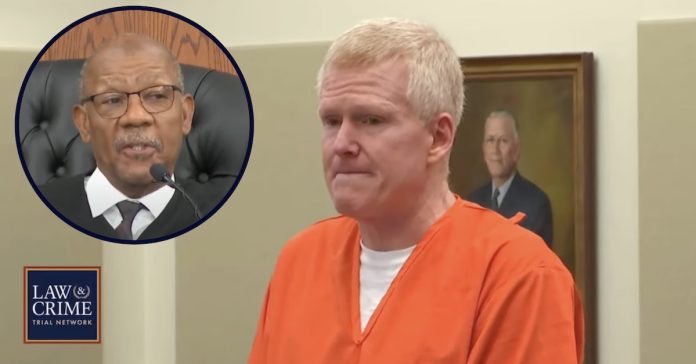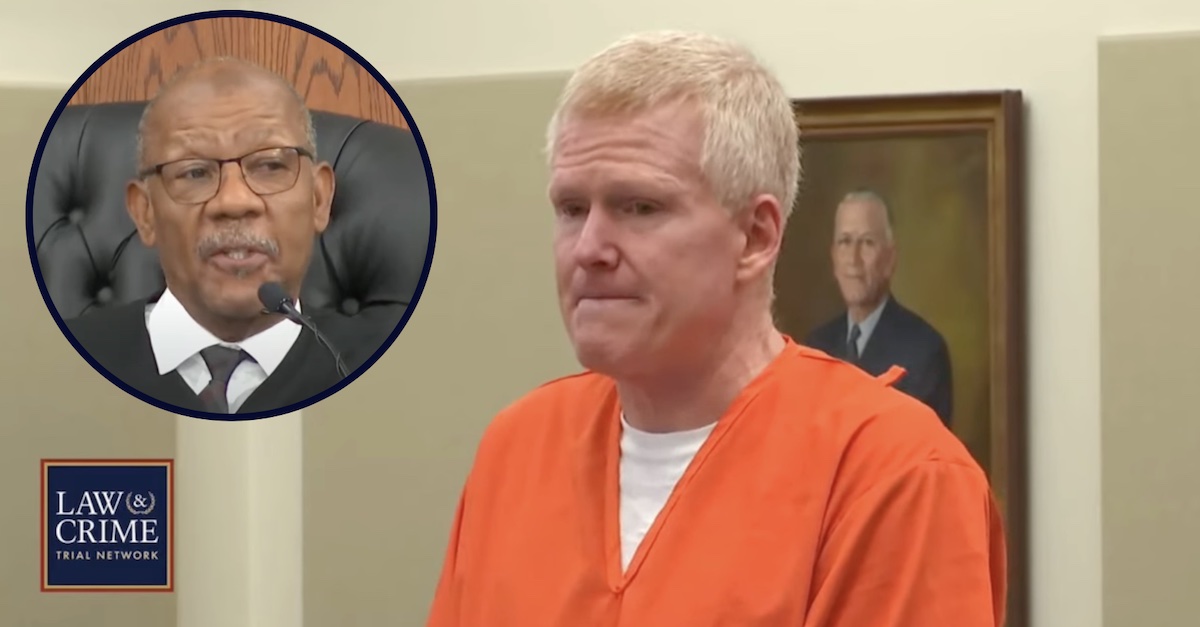
Judge Clifton Newman, Alex Murdaugh pictured on Nov. 28, 2023. (Law&Crime Network)
Convicted family murderer Richard Alexander “Alex” Murdaugh, 55, faced the music in South Carolina court on Tuesday as victims of his admitted million-dollar frauds spoke about the devastating consequences of the disbarred attorney’s financial crimes against 18 clients.
After listening to everything that the victims and the defendant himself said in statements before the court, Judge Clifton Newman said to the defendant, “I don’t even know who I’m speaking to now” — just as Murdaugh’s clients didn’t know who they were speaking to then, when he cheated them out of money that was theirs.
Newman commented that in his 47 years as a lawyer, he experienced “no greater joy” than “having a satisfied client” and “delivering good results.”
To see Murdaugh pervert the role of the attorney in such a way, as the defendant admitted, despite all of the appearances of being a “fun-loving, happy person,” rendered the defendant “quite an enigma,” the judge said. Newman then sentenced Murdaugh to 27 years in state prison.
Murdaugh’s sentence was more formality than mystery, as the November plea agreement included a negotiated recommendation from the state of 27 years in prison. The inmate serving life in prison without parole for the June 7, 2021 murders of his wife Margaret “Maggie” Murdaugh, 52, and son Paul Murdaugh, 22, pleaded guilty on Nov. 17 to 22 counts in the money laundering, financial fraud, and breach of trust case that originally racked up a 101 counts against the defendant.
“I agree that I wrongly took all of that money, your honor, and did all of those crimes,” Murdaugh said when pleading guilty earlier this month, a proceeding that took place roughly two months after he pleaded guilty in a federal conspiracy, bank fraud, wire fraud, and money laundering cases.
Perhaps the most nationally recognized Murdaugh fraud victims were Gloria Satterfield, the Murdaugh family nanny and housekeeper of more than two decades, and her sons.
Satterfield died at 57 in 2018 at the Moselle property in South Carolina where Maggie and Paul Murdaugh were shot to death years later. Alex Murdaugh infamously blamed Gloria Satterfield’s fatal fall down stairs on his family’s dogs and, through that lie, was able to reap the benefits of $4.3 million in insurance settlement money through insurers Lloyd’s of London and Nautilus.
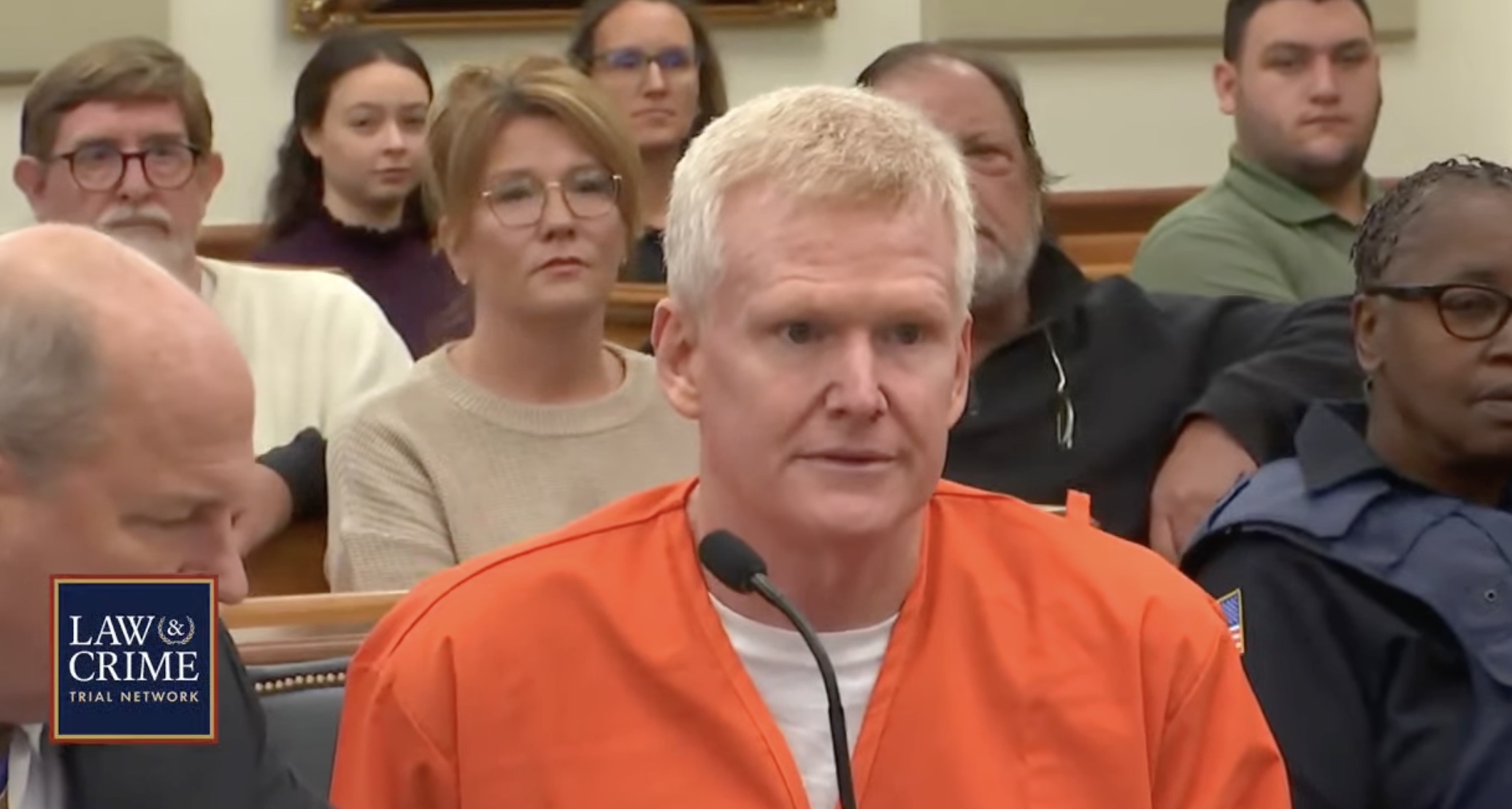
Alex Murdaugh appears in court for financial crimes sentencing on Nov. 28, 2023. (Law&Crime Network)
Prosecutor Creighton Waters began Tuesday by describing Alex Murdaugh’s schemes as a “sleight of hand,” where he would hand victims a check while stealing behind their backs.
That’s what Pamela Pinckney has said Murdaugh did to her and her son Hakeem, who died two years after he was paralyzed in a crash.
Rather than helping her and her quadriplegic son, Alex Murdaugh circled around the Pinckneys like a vulture.
“He painted a pretty picture in front of my presence. But behind my back, it was otherwise,” Pamela Pinckney said in 2022. “I was just in disbelief. Up until this day, it’s like it just doesn’t seem real to me, what really took place and what happened.”
Disgraced attorney Cory Fleming, Murdaugh’s sentenced federal co-conspirator, admittedly played a role in stealing settlement funds from Hakeem Pinckney’s estate. From the DOJ:
In addition to the scheme Fleming admitted to in his guilty plea, Fleming was held responsible at sentencing for the theft of settlement funds from a client whose son passed away after being rendered a quadriplegic in a car accident. Specifically, Fleming used $8,528.46 of the estate’s funds to issue two checks to pay for a private plane to attend the College World Series, and he wrote a $4,560 check from the estate’s trust account directly to Murdaugh claiming the funds were legitimate expenses. Finally, Fleming used $89,133.44 remaining in the trust account to issue a check for Murdaugh’s benefit rather than properly disbursing the funds to the estate.
Murdaugh was the one who referred the Pinckneys and Gloria Satterfield’s family to Fleming. Gloria Satterfield’s sons, Waters said, never received a dime of millions in settlement funds after their mother’s death.
Fleming was sentenced in the state case to 20 years in prison back in September.
But defendant Murdaugh was also able to commit various financial crimes, the prosecutor said, through corrupt Palmetto State Bank CEO Russell Laffitte — himself the scion of a family dynasty and a conservator for Alex Murdaugh’s personal injury clients. Though Laffitte has not stood trial following his indictment in the state case, the ex-banker was convicted and sentenced in August to federal prison for a string of frauds that the feds said targeted “unusually vulnerable victims.”
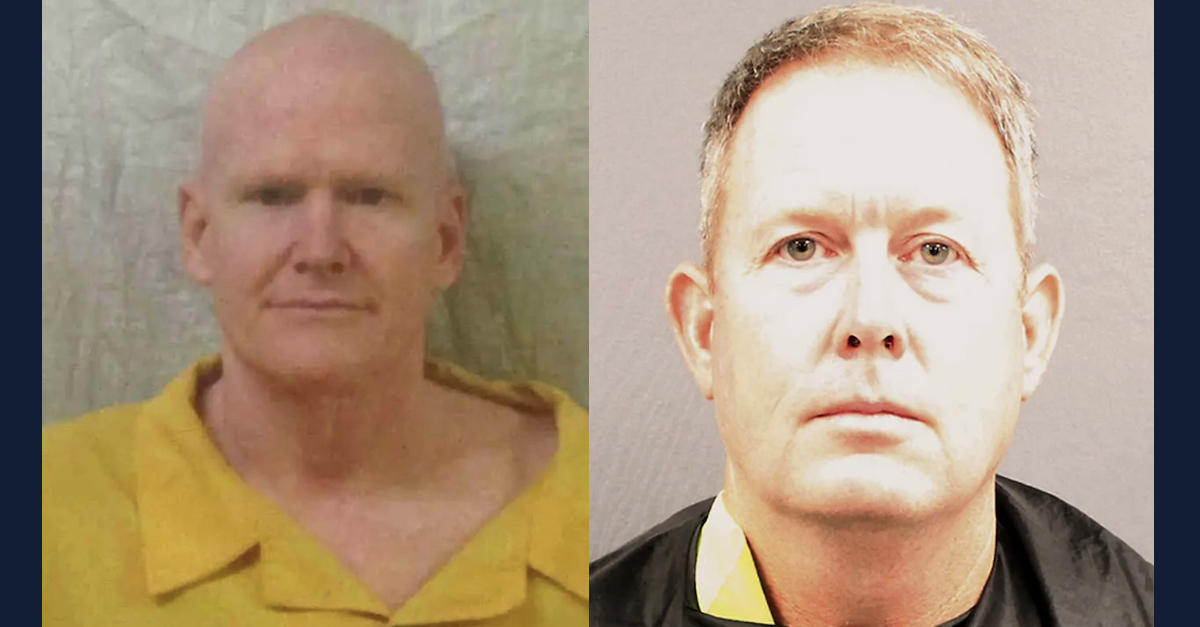
Alex Murdaugh, on the left, and Russell Laffitte, on the right, appear in mugshots. (South Carolina Department of Corrections; Kershaw County Detention Center)
Waters said that Murdaugh’s power, trust, and influence, in South Carolina, in no small part due to the longstanding family legal dynasty established by his predecessors, enabled him to commit crimes under the guise of being an upstanding citizen of regional importance.
Alex Murdaugh abused the trust of staffers and colleagues at his family’s law firm — then known as Peters Murdaugh Parker Eltzroth & Detrick and since renamed the Parker Law Group — to steal hundreds of thousands of dollars from the Pinckneys for his personal use, whether to pay back a personal loan, to pay his father, or to pay conservatorships in other cases, Waters said.
Murdaugh also created a fake corporation called “Forge” and funneled stolen money into it for his own use, largely to pay off outstanding loans (including for Moselle) that were in constant danger of defaulting, Waters said.
By way of example, prosecutor Waters said that Elise Mallory went to Murdaugh after hearing he was “the best in town.” Mallory was grieving the death of her daughter Sandra Taylor, a mother of three who was killed by a drunk driver in 2019.
Murdaugh, even under these circumstances, put his “insatiable need for cash” over the needs of the particularly vulnerable.
“[Ms. Mallory] put this case in his hands, and he kept coming back and saying the case was worth less and less and less,” Waters said. Murdaugh ultimately told her the case was only worth $30,000 — $10,000 for each of the three minor children who lost their mother.
In reality, Waters said, the case settled for $183,000, more than $100,000 of which was funneled into “Forge” and tens of thousands of which were set aside for attorney’s fees.
Ultimately, Waters said, “Ms. Mallory never got one dime.”
After the state finished its statements, court had a brief break.
When everyone came back into the courtroom, Eric Bland, an attorney for Murdaugh victims, blasted Alex Murdaugh for committing unlawful acts that placed him on “the Mount Rushmore of criminals.”
Bland said that Murdaugh did not just steal from strangers in need, but committed “close theft” against victims, like Gloria Satterfield, who the defendant had known and “broke bread with” for decades, and her sons.
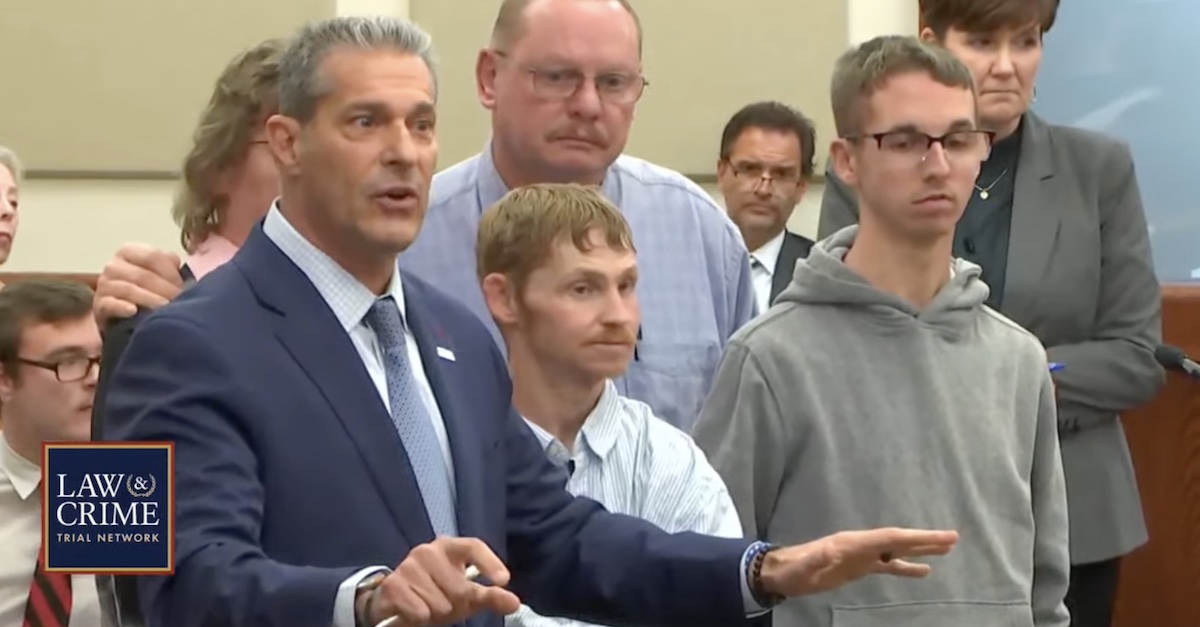
Attorney Eric Bland with Gloria Satterfield’s sons Brian Harriott and Tony Satterfield on Nov. 28, 2023. (Law&Crime Network)
The lawyer said that Murdaugh “hit for the cycle,” by committing all manner of crimes, culminating in the murders of his own wife and son.
“He did it for 16 years,” Bland said. “It isn’t a white collar crime, it’s a red collar crime.”
“It never stopped. The only reason it stopped was because of the boating accident or it would have continued,” the lawyer added, referring to the 2019 boat crash that killed 19-year-old Mallory Beach. Alex Murdaugh’s son Paul Murdaugh, not yet 21 but during a night of drinking, was behind the wheel and crashed the boat he and his friends were on. Later, Paul Murdaugh was caught on a convenience store’s camera buying beer with his older brother Buster Murdaugh’s license.
After Bland spoke, Gloria Satterfield’s son Tony Satterfield delivered a victim impact statement directly to Murdaugh for lying about his mother’s death to steal.
“I really don’t have words. You lied, you cheated, you stole, you betrayed me and my family and everyone else,” he said.
Despite this, Tony said, “I want you to know that I forgive you” and “I will pray for you every day.”
Pamela Pinckney was the next victim to speak. She began by saying she is an ordained evangelist who has Christ in her life. Like Tony Satterfield, she forgave Alex Murdaugh and said her faith in God was the only way she was able to do so.
“Because of what you did to me, I thank God for giving me strength to get through what I went through, because without God I wouldn’t be here,” Pinckney said. “And to you, Alex Murdaugh, I never thought that you would betray me and did me and my family the way were done at a vulnerable time in our life, at our lowest estate.”
“We was in a terrible motor vehicle accident and you just took us for granted,” she continued. “But all I want to say to you is I forgive you from my heart. On this day and forevermore, my prayers and endeavors shall be with you, and God bless you.”
“Thank you,” Alex Murdaugh could be heard saying, as he nodded his head while seated in court.
Jordan Jinks, who played ball with Alex Murdaugh growing up and considered him a close friend, was also a victim of the defendant’s settlement frauds.
In an emotional statement, Jinks said that he couldn’t believe that Alex Murdaugh would murder his wife Maggie and son Paul and was saddened to see him in an orange jumpsuit. But listening to the facts about his “devious” financial crimes was a game-changer for Jinks.
“It changed my mind, bruh,” he said, asking Murdaugh twice: “What kind of animal are you?”
Jinks even said that he would have given Murdaugh the money he stole if he asked for it.
“You didn’t have to steal from me, man,” Jinks said, lamenting the “talent” that Murdaugh wasted to commit crimes against others and him, a longtime friend whose spine and knee were injured in a 2016 car crash.
After the lawyers finished working through particulars surrounding the plea, the judge allowed Alex Murdaugh to have one handcuff removed as he addressed the victims.
Throughout the proceeding, the convicted murderer seeking a new trial carefully noted that he was apologizing for the financial crimes he pleaded guilty to committing.
“I want each of you that spoke to know that I listened to you, I heard you, your pain and your hurt is palpable. I get it. It’s reasonable, but I promise you that it resonates with me. I understand,” Murdaugh began. “I hope that the time will come when you look back and know the despite the things that I did, that I care about each one of you. Because I do. I did terrible things. Each of you placed your trust in me. I was very proud of that, and I’m still today honored by that fact. But I deceived each of you terribly. I did terrible things.”
“It’s so important to me that you know how bothered that I am by the things that I did,” he added. “That is important to me.”
Murdaugh then said he’s learned behind bars that his addiction to opioids was an escape from the realities of crimes he committed against so many.
“After hours, days, weeks and months of self-reflection,” Murdaugh continued, “I know now that I took more and more and more pills because I was hiding — attempting to hide — from the reality of things I was doing to all of you.”
“I do care about each of you,” he insisted with emphasis.
Next, Murdaugh spoke directly to Jordan Jinks, whom he called “JJ.”
“We grew up together. JJ we hunted and fished together, alone all over the Lowcountry,” Murdaugh said. “I mean, I think we’ve talked to each other about everything that’s important to both of us. And, man, I hate the things that I did. Our daddies were the best of friends.”
“I mean it, when I say that I care about you, as hypocritical as that seems in light of the things that I did, it is so very true,” he added. “I did care about each of you, and I still care about each of you.”
“I hurt the ones I loved the most the worst,” Murdaugh acknowledged, before addressing Gloria Satterfield’s sons.
“There is no person, no person period, that was more important to my family than Gloria was — to all of us, to me, especially to Maggie, to Paw Paw,” Murdaugh said. “Lord know he adored her, and I hope you know that. And Buster, and me too. I adored her. And I am so sorry for the things that I did.”
The defendant again admitted that he made up the story about his family’s dogs causing Gloria Satterfield to fall down the stairs, but claimed he did so with “good intentions.”
“Tony, Brian when I decided to make up the story and the claim about the dogs and Gloria I did it with good intentions of helping you. I am so sorry that those intentions very quickly became selfish,” he said. “And I am so sorry that I continue to involve you in my actions. And I am so sorry for everything, that you […] have been through.”
Murdaugh, while blaming the media and social media commentators for “unsubstantiated” and “baseless” smears of his family members, including his son Buster, apologized to those relatives for humiliating them and “destroying” the legacy built by his father and grandfather.
As Murdaugh began to wrap up his lengthy courtroom speech, much of which was spent apologizing for embarrassing his family and former law partners, he again traced his financial crimes to his drug addiction.
“I’m still not sure how I let myself get where I did. Where I could do things that I did to all you people that I care about,” Murdaugh said. “I’d like to say to any and everyone suffering from addiction, please get professional health. Don’t let pride get in your way like I did. I had people who loved me, who tried to help me, many, many more people who I know would have helped me. I had resources, I had access to more resources, and I still couldn’t beat it. I tried many, many times. It’s just too hard. I say please get professional help.”
“I’m very proud as I stand here today to be 812 days clean. But I didn’t do it soon enough,” Murdaugh said. “Please get help now.”
Shortly thereafter, Murdaugh’s statements ended and Judge Newman called for a 45-minute lunch break.
After the jurist returned to the bench, prosecutor Creighton Waters got in a last word by suggesting Murdaugh’s “soliloquy” was just another instance of the defendant selling his victims a bill of goods. Waters said Murdaugh, in that speech, focused more on how he was perceived by others than anything else.
Judge Newman spoke next. Newman said that though he has lived with the Murdaugh cases for “over two years” now, he has just 34 days left on the bench before retirement.
Once those days pass, Newman said, “I will turn the page and leave you behind.”
Calling Murdaugh “quite an enigma,” the judge reflected on his own past perceptions of the defendant.
“I can only recall you as being a fun-loving, happy person. I’ve never seen you sad. I’ve never seen being anything other than a friendly, caring person. And it’s so disappointing to see you again in this setting,” the judge said.
Newman recalled that the last time he and Murdaugh saw each other — before Murdaugh was in jail, that is — they encountered each other at a conference. There, Murdaugh was poolside “having a good time” just a couple of months after his wife and son’s violent deaths.
“But you were having a good time, made nothing of it,” Newman said. “Then the Labor Day weekend events occurred and next thing I know I’m assigned to preside over all your matters.”
Have a tip we should know? [email protected]
